Those who were there, remembered the guttural roar that lifted the stadium into the Gods. In the 2015 Six Nations, the Welsh defence had withstood an Irish onslaught that would have made the teams’ forefathers burst with pride. Forty-five phases of patient ferocity from Ireland and the red wall had not yielded. At the end of a bruising 23-16 win, the tackle stats made for eye watering reading. The 23 players had made 250 tackles, with Luke Charteris topping the charts with 31 and Sam Warburton and Taulupe Faletau matching each other, tackle for tackle, to reach 23 hits.
Rewind to November 2008. When the All Blacks performed the Haka at Cardiff’s Principality Stadium a resolute line of fifteen red jerseys responded by defiantly holding their ground. For 90 seconds referee Jonathan Kaplan struggled to break up the stand-off as Wales, spurred on by a partisan crowd of 74,500 supporters, demonstrated their intent not to retreat an inch. It was a defiant gesture that set the tone for Warren Gatland’s tenure and captured the unity and strength of Wales under defensive lynchpin Shaun Edwards. Despite losing the match 29-9 to an All Blacks side playing at a giddy level, this visceral moment encapsulated the spirit of hunger and determination that was to define the Welsh defence for so long.
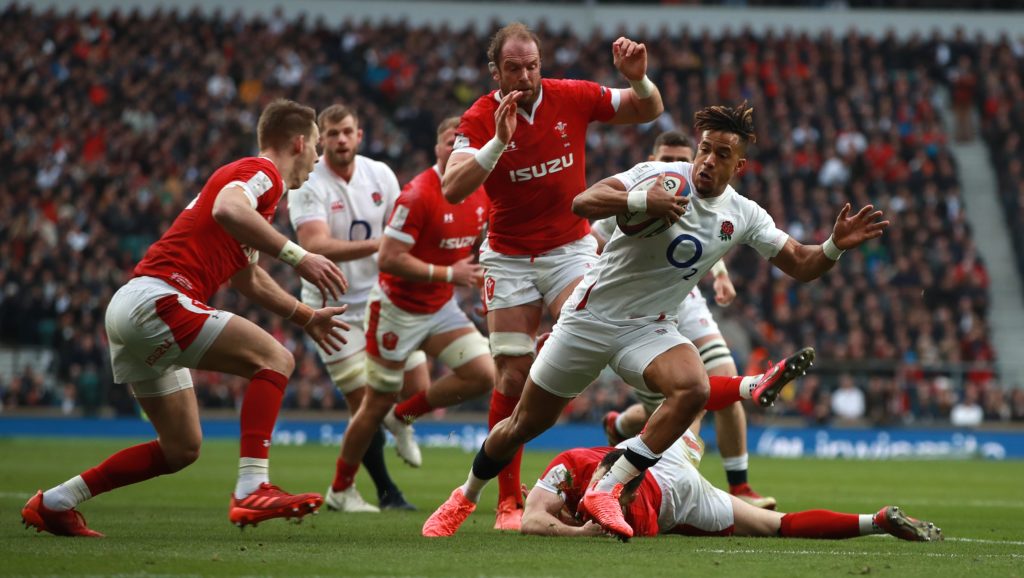
The end of an era for Welsh rugby came in Japan a year ago, as highly-rated defence coach Shaun Edwards headed for French leave, after briefly flirting with extending his contract with the Welsh management, after 12 years in the position, leaving the responsibilities to be shared by Byron Hayward, Wales’ new defence coach, and former Wales captain Sam Warburton, who assumed the role of technical advisor to the defence and breakdown. Warburton left his part-time role earlier this month, as Gethin Jenkins had to be parachuted in at short notice to add his hard-earned experience to the role.
The defensive transition has been far from smooth with Wales, so far, posting a porous defensive record in this year’s Six Nations. With the denouement of the 2020 tournament and the upcoming Nations Cup, Wales’ defensive frailties will be targeted by their opposition as the squad faces further scrutiny if they cannot address their weaknesses.
Wales have conceded a total of 84 points in their meetings with England, France, Ireland – after nilling Italy in their opening fixture – an average of 28 points shipped against their rivals. Famously, in the 2008 Six Nations, Wales only conceded two tries in the entire tournament.
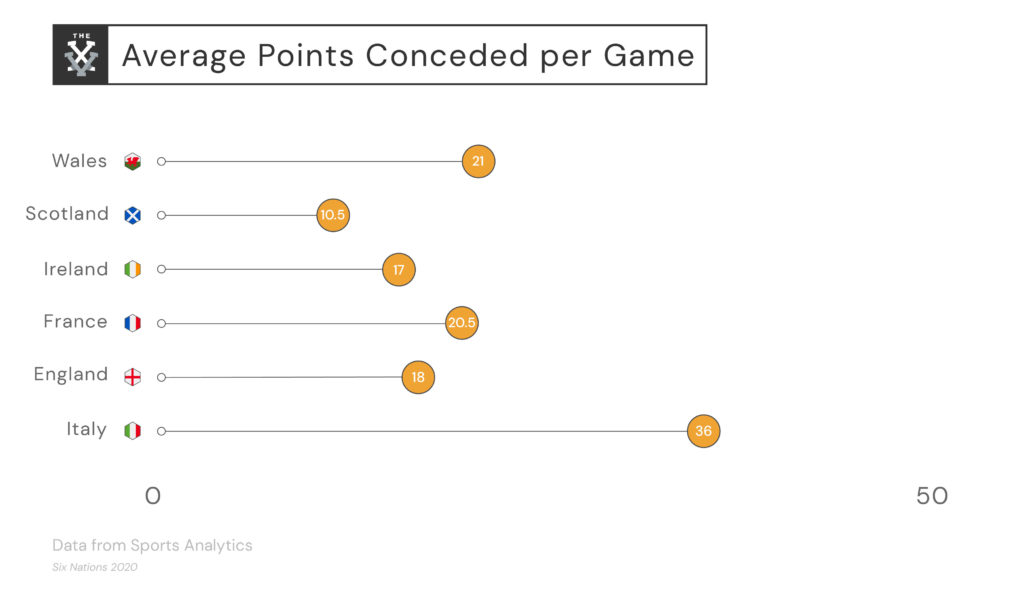
There appears to be no quick fix for Hayward whose post-match analysis sessions must have involved a fair bit of head scratching and furrowed brows. Wales’ field position was controlled by England’s clever kicking game in their most recent fixture and they were territorially dominated by France as well as missing too many tackles in important positions. Against Ireland, they conceded 21 turnovers to Andy Farrell’s men’s 13. They were also caught too narrow around the edges in Dublin, with Andrew Conway finding space out wide and Jordan Larmour slaloming through the Welsh defence from close range. Against Les Bleus they had been picked off by an interception, punished for spilling a high ball. While at Twickenham, Wales were upended for Anthony Watson’s try in the first-half, after Ben Youngs’ inside pass had wrong-footed the Welsh rearguard action.
It is easy to attribute this sudden change in defensive fortunes to teething pains as the new management settles in, but the data points towards a lack of tactical acumen from Welsh players. Normally so well organised up until the final whistle, Wales have snatched 31 turnovers but have conceded 72, the second highest of any nation in this year’s tournament.
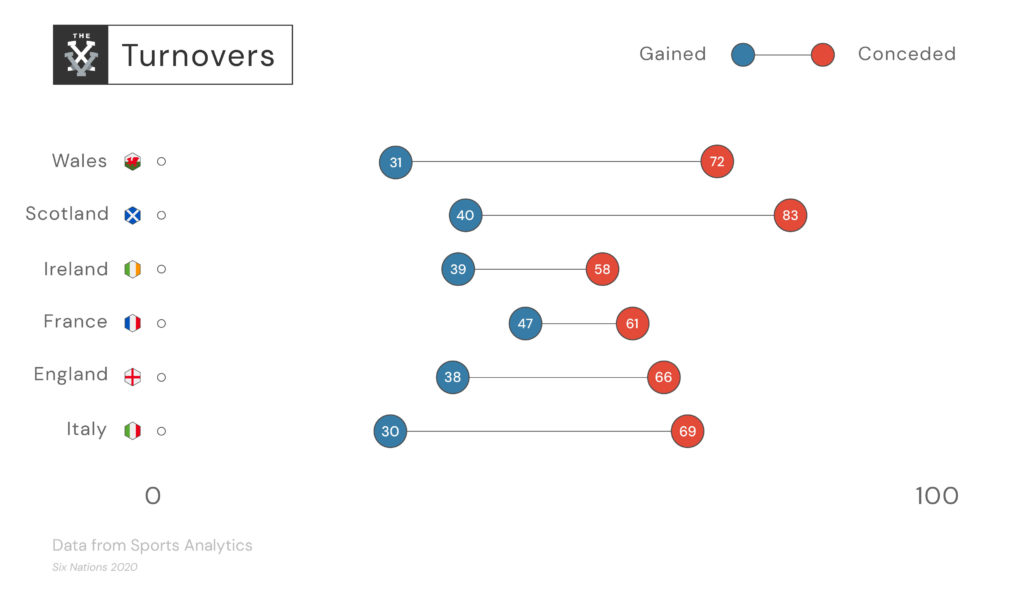
It is alarming to see that 35 of these 72 turnovers were conceded as a result of handling errors by Wales, a statistic which outnumbers that of any other team in the Six Nations. The now departed Hadleigh Parkes and Leigh Halfpenny, share the honour of being the worst offenders of all nations in the competition, both recording five handling errors that led directly to a turnover in possession. It is this lack of high-level execution that will continue to cost Wales against Scotland if they are not more accurate.
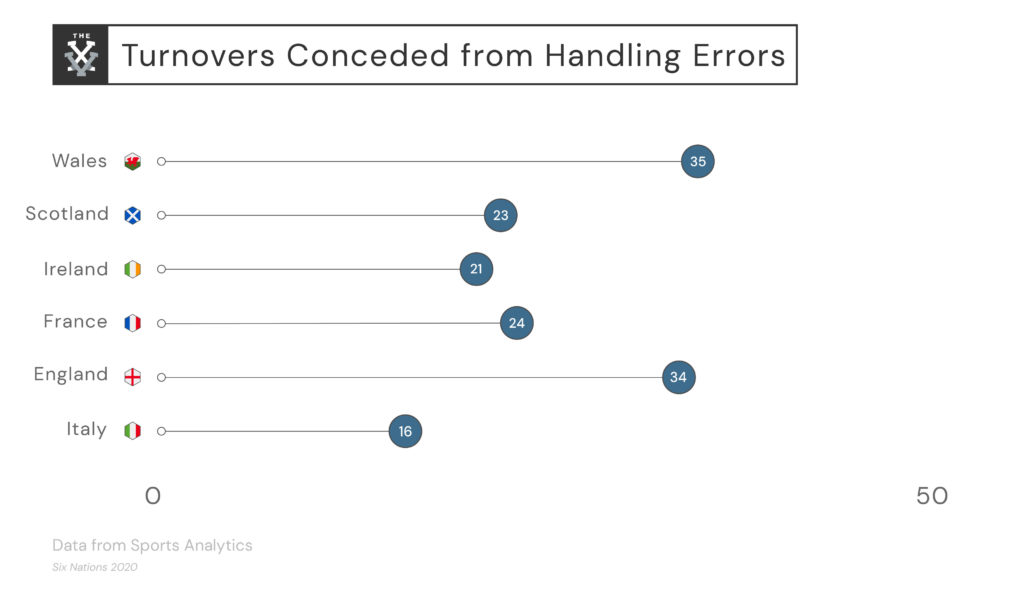
On top of this, nine prominent members of the Welsh squad fell well below the Six Nations average tackle completion rate of 88% – meaning the percentage of tackles made by a player that were successful. With all but one of these players occupying a position in the backline, this points towards a weakness in Wales’ ability to nullify opposition runners in broken-field play situations, a weakness that can be exploited by opposition teams in November’s matches.
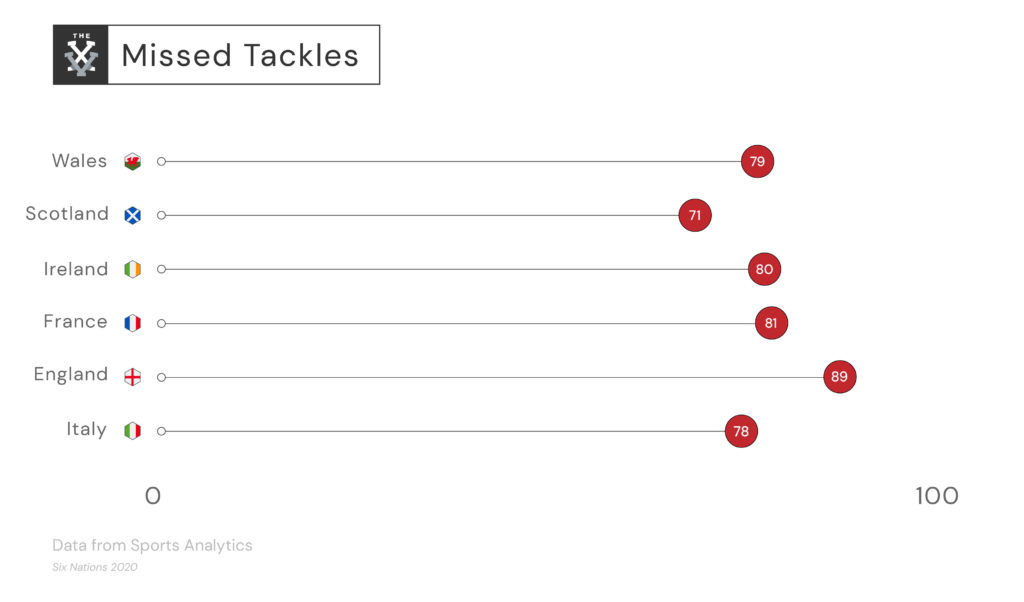
A concern is the below-par tackle completion rates of George North (69%), Nick Tomkins (68%) and Johnny McNicholl (57%), players who appeared in all four of Wales’ Six Nations fixtures thus far and who come in shy of the 70% mark. These back three players for Wales are underperforming and with the normally excellent Leigh Halfpenny recording a tackle completion rate of just 71%, attacking coaches in the upcoming internationals should be looking to spread the ball quickly and target the Welsh backfield.
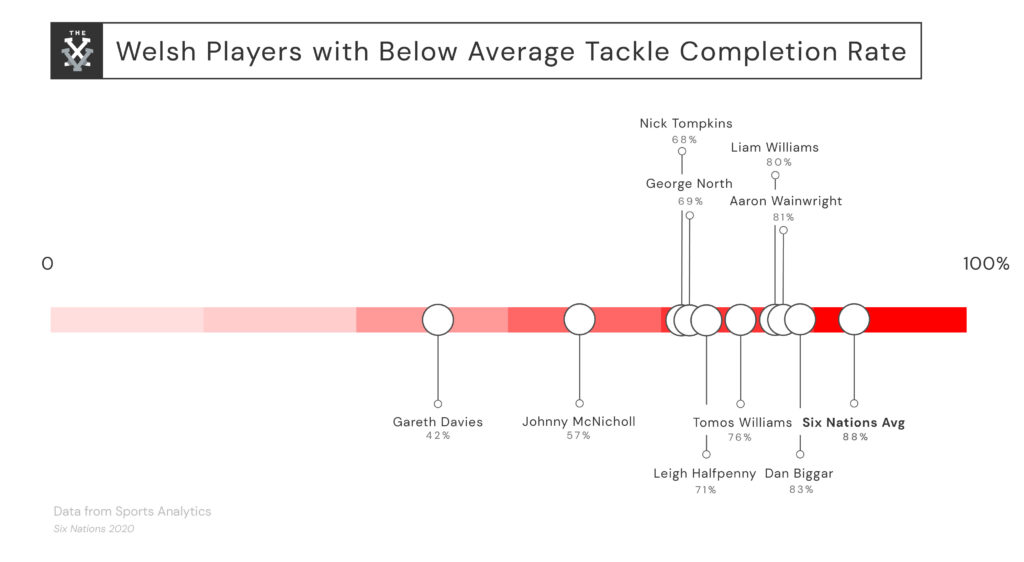
One facet that should improve their solidity is the timely return of defensive captain, Jonathan Davies, although he was unable to stop Wales being cut apart by the smart running lines of Antoine Dupont last weekend and individual brilliance of Teddy Thomas. The frailties appear to be collective, and in the new defensive system being adopted but with Finn Russell, Stuart Hogg and Darcy Graham in Llanelli, licking their metaphorical lips, it will be interesting to see if Wales’ defensively fallibility has been addressed.
If you’ve enjoyed this article, please share it with friends or on social media. We rely solely on new subscribers to fund high-quality journalism and appreciate you sharing this so we can continue to grow, produce more quality content and support our writers.



Comments
Join free and tell us what you really think!
Sign up for free